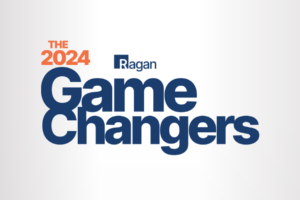Communications Week board members share how they’re working with AI
How three communications leaders are getting employees and other stakeholders comfortable with AI.

With Communications Week just over two months away, Ragan convened our esteemed Comms Week advisory board to learn how they are future-proofing their strategies and responding to the most hot-button issues affecting the communications function.
We first asked how they teach their teams to work with artificial intelligence (AI). Here’s what we learned.
Comms leaders are helping others get more comfortable with generative AI
We cover AI extensively at Ragan, sharing tips on everything from writing effective prompts to navigating legal concerns and crafting guidelines. We offered a certificate course on using AI for comms, and partnered with The Conference Board on a proprietary study to look at communicators’ top concerns, which include misinformation and a lack of accuracy, legal uncertainties, data security and privacy.
The Comms Week board echoed these concerns before sharing how they are getting out in front of them.
Peppercomm founder and CEO Steve Cody said that his agency sets aside a half hour every Thursday to brainstorm for either an existing client or a prospective client, making sure whoever leads the brainstorm is using generative AI to supplement their research. “We want them to be comfortable with it,” Cody said.” And we also want our people to try and figure out what was created by the individual versus the generative AI. So it’s kind of like a little bit of a ‘Jeopardy!’ game mixed into a brainstorm.”
AI as the enabler, not the enemy
Tiffany Guarnaccia, CEO of Kite Hill PR and the founder of Communications Week, pulled back a bit to look at the bigger picture. “I think AI should be an enabler and not an enemy when it comes to how we’re working and how we’re thinking about business,” she said, acknowledging that her perspective comes from working in a tech PR agency.
“We launched a tech task force that’s looking at AI as just one piece of the evolving comms tech stack that we’re continuing to evaluate,” she continued. “We’re also following the PRC guidelines. I think they did a good job of laying out things from an ethical perspective.”
Ultimately, Guarnaccia acknowledged that we are all led by the decisions or applications in different platforms as they apply to our daily workflows.
“The other challenge is how it continues to evolve,” she said, “and in every challenge, there’s an opportunity for the team. It’s also coming back to showing the value of strategy, because AI is replacing some things that are maybe more tactical when we look at our work. It spotlights the opportunity to be more strategic and a strategic partner to our clients.”
Calming employee concerns about AI
Of course, being a strategic partner to clients and colleagues a lot includes addressing their concerns. That’s why Cody’s team leans on the Chief Technology Officer Tejas Totade at parent company Ruder Finn, who gives Peppercomm employees a monthly tutorial on the latest, greatest thinking around what’s new, what to be concerned about and what not to worry about.
“It’s an ongoing, continuous learning part of the professional development program,” says Cody.
The futurist perspectives of a CTO who is comfortable communicating make Totade a perfect leader to address concerns, as he starts and ends each of his half-hour presentations with a focus on what it means to employees.
Totade breaks it down by sharing, “This is what you need to know, this is what it means to me, and this is what I think it means to you,” Cody explained. “This is what you should be worried about, and this is something that you should not worry about. This is what’s going to make you even more effective.”
Upskilling the next generation of communicators on AI
Columbia Business School Chief Marketing and Communications Officer Amy Jaick summarized the breadth of conversations happening around AI at Columbia, where faculty members conduct research and use the tools in the classroom, students are thinking about how to integrate it into assignments when appropriate, and other employees are using it to streamline their productivity.
Witnessing all of this, Jaick shared the stakeholder consensus that we shouldn’t be worried about people being replaced by generative AI — but we should worry about being replaced by the people who use it.
“It’s not quite there yet where it will take our jobs,” she said. “But you should be worried about the person who knows how to use it to do their job better because they will be quicker and more efficient, more creative, whatever the more is.”
This underscored Jaick’s big point—that understanding and being trained on AI should be of primary importance. Beyond writing prompts, training should also include reaching a consensus on what constitutes proper attribution of AI-generated work.
“When does AI go from being a tool to being a substitute for your own ideas, or a heavily defined input,” she asked. “Where is the line between being additive or being a compliment? When is it a substitute?”
Stay tuned for more coverage of this Communications Week roundtable and register now for the signature Comms Week Event, Ragan’s Future of Communications Conference, before it sells out!







